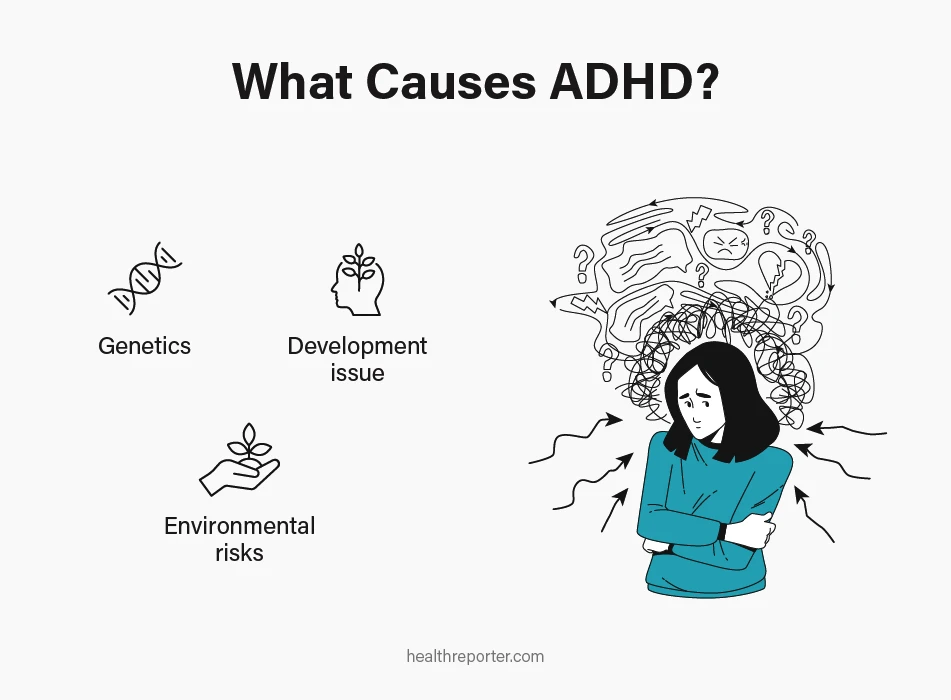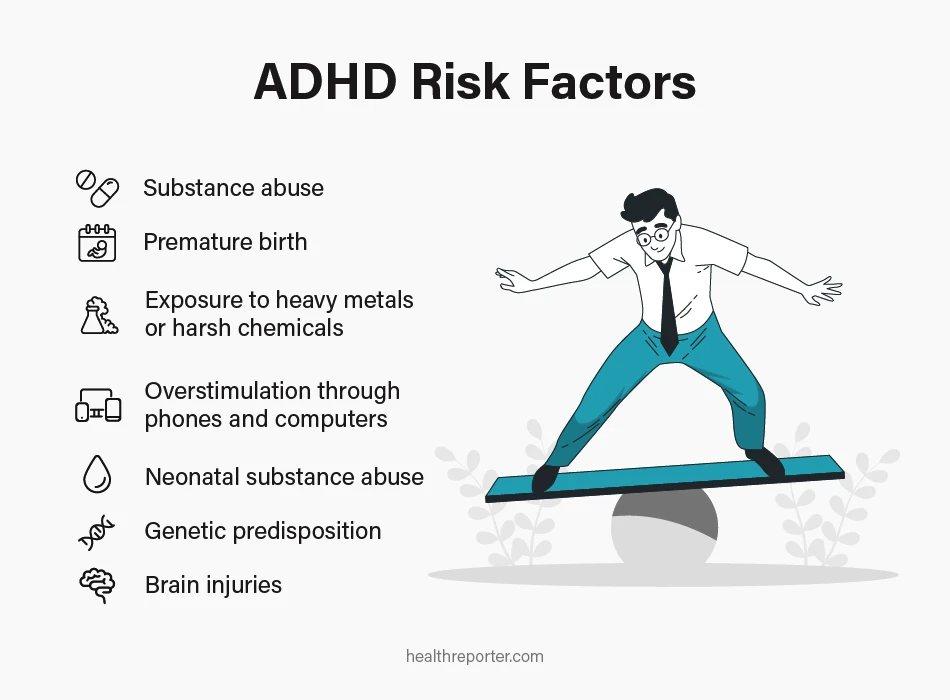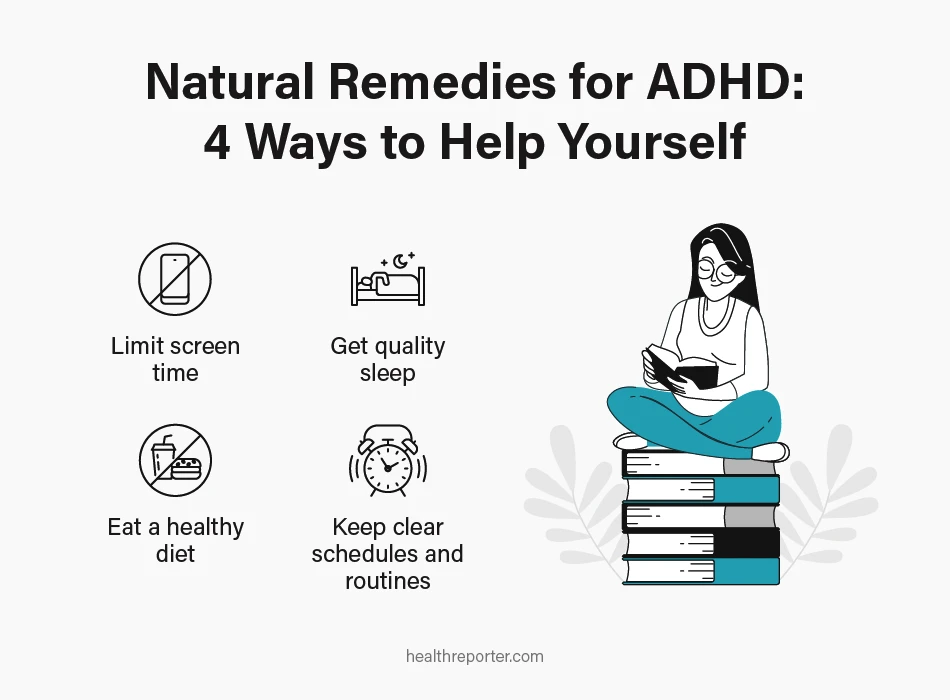Understanding ADHD: Symptoms, Causes, and Treatment
How to thrive with ADHD? We reveal the best strategies for managing challenges and embracing your uniqueness.

Attention deficit hyperactivity disorder (ADHD) affects up to 5% of American adults, and that number seems to be growing all the time.
If you resonate with some of the ADHD symptoms, such as an inability to manage time and struggling with disorganization, or notice that your child is struggling in school, you may be wondering if ADHD is the problem.
In this article, we’re going to explain exactly what ADHD is, give you a better idea of the symptoms for both children and adults and set you up with some tools for getting a proper diagnosis and managing challenging symptoms.
What Is ADHD?
Attention deficit hyperactivity disorder (ADHD) is a neurodevelopmental disorder that tends to begin in childhood but continues into adulthood.
Individuals with ADHD usually struggle to retain focus making it difficult to concentrate, have a hard time sitting still, and lack impulse control, which can look like interrupting other students in childhood or overshopping in adulthood.
Symptoms of ADHD: An Extended List
Individuals with attention deficit hyperactivity disorder generally struggle with a lack of focused attention, hyperactivity, and impulse control, which can look different depending on the person.
Further, children with ADHD are separated into three groups: inattentive, hyperimpulsive, and a combination of the two. Below, we will discuss in greater detail the specific ADHD symptoms of these three groups, as well as the changes between children and adults.
ADHD in children
Inattentive:
- Easily distracted
- Spends a lot of time daydreaming
- Doesn’t finish tasks
- Has a hard time following directions
- Doesn’t like to sit still
- Never seems to be paying attention
Hyperimpulsive:
- Tends to squirm or fidget when seated
- Interrupts other students
- Blurts out answers in class
- Struggles with playing quietly
- Always running and climbing on things
- Has trouble waiting their turn
- Often suffers from learning disabilities
Combination of inattentive and hyperimpulsive:
- Any combination of the previous ADHD symptoms
ADHD in adults
- Not detail-oriented
- Struggles with organization
- Inability to manage time/always late
- Has a habit of starting new tasks before finishing old ones
- Easily distracted
- Engages in risky behavior with little consideration for consequences
- Difficulty staying on task
- Struggles with procrastination
- Misuses substances
- Gets easily frustrated
- Greater risk of developing eating disorders
- Intense and rapid mood swings
What Causes ADHD?
The exact cause of ADHD is not fully understood. However, research suggests that a combination of genetic, neurological, and environmental factors contribute to its development.
Below, we’ll go into greater detail regarding how each factor can influence the development of ADHD in children and adults.

#1 Genetics
Research points to genetics as playing a significant role in the development of ADHD, with studies showing the heritability of ADHD to be anywhere from 77% to 88%.
This is likely because of the role that the proteins produced by the brain play in the development of the brain, affecting the production, growth, and organization of the neurons, which are responsible for balancing levels of dopamine, a neurotransmitter that helps control movements and emotions.
#2 Development issue
Developmental issues during early brain development may contribute to differences in brain structure and functioning.
Factors such as prenatal exposure to toxins that affect the central nervous system, brain injuries, or disruptions in brain development can potentially influence the risk of developing ADHD or increase the severity of symptoms.
Premature birth and low birth weight have also been linked to an increased risk of ADHD. Research shows that babies born prematurely, meaning at 33 weeks or less, are 2–3 times more likely to be diagnosed with ADHD later in life.
#3 Environmental risks
Although ADHD is considered to be mostly impacted by genes, environmental factors still play a significant role in an individual’s development of ADHD.
Some of the risk factors thought to impact the development of ADHD include drugs or alcohol being consumed during pregnancy, exposure to heavy metals and other chemicals, nutrition, and other general lifestyle factors like lack of sleep.
ADHD Risk Factors

The following are some factors that may put you at higher risk of either developing attention deficit hyperactivity disorder or experiencing a worsening of pre-existing ADHD symptoms:
- Substance abuse
- Premature birth
- Exposure to heavy metals or harsh chemicals
- Overstimulation through phones and computers
- Neonatal substance abuse
- Genetic predisposition
- Brain injuries
How Is ADHD Diagnosed?
It can be difficult for doctors to diagnose ADHD, and it’s not unusual for individuals with ADHD to first be diagnosed with a mood disorder, such as depression or bipolar disorder, since there is an overlap of symptoms, like irritability, difficulty concentrating, and mood swings.
In adults, getting an ADHD diagnosis can also be difficult as they’ve often learned techniques for masking their symptoms – though most adults with ADHD tend to have similar mental health issues, such as lower self-esteem and anxiety disorders, after years of dealing with the daily challenge of living with an undiagnosed mental condition.
For both children and adults, diagnosing ADHD can be challenging because there is no one test you can use to spot it.
Primary care doctors tend to recommend parents or individuals seeking an ADHD confirmation to a mental health professional with experience in diagnosing and treating ADHD.
There, they use a wide range of methods to confirm a diagnosis, such as:
- A full medical examination to rule out other health or mental conditions
- A medical history of both the individual and family to assess hereditary predisposition
- A neurological assessment designed to test hearing, verbal, and motor skills
- For children with ADHD, an evaluation done by both teachers and parents assessing intelligence, personality traits, and processing skills
- For adults, a lengthy assessment of possible missed childhood symptoms
How Is ADHD Treated?
From medication and therapy to remedies you or your loved one can use from the comfort of your own home, there are many ADHD treatment options for you to choose from.
Medication
One of the most popular treatment options for attention deficit hyperactivity disorder is ADHD medication, with one of the most common drugs being methylphenidate, a stimulant that increases activity in the part of the brain responsible for controlling attention and behavior.
Though there are also other stimulant medications available for individuals who do not respond to methylphenidate or who experience unwanted side effects, such as lisdexamfetamine, dexamfetamine, atomoxetine, or guanfacine.
Therapy
Cognitive behavior therapy (CBT) is regarded as the best therapy option for individuals with attention deficit hyperactivity disorder.
It helps them gain control over their impulse behaviors, address habits affecting their productivity, and improve their overall emotional and mental well-being.
Though any form of cognitive therapy can be helpful for addressing the negative symptoms associated with attention deficit hyperactivity disorder, ADHD-specific CBT therapy has been shown to offer the best results.
Natural Remedies for ADHD: 4 Ways to Help Yourself
If you’re looking for holistic remedies for ADHD, either to be used on their own or in tandem with ADHD medications and therapy, this is a great place to start.
Keep in mind that the following suggestions can be implemented by adults with ADHD and parents of ADHD children.

#1 Limit screen time
Too much screen time, either on TVs, computers, or tablets, has been linked to a number of mental and physical ailments in both adults and children, such as sleeping problems, changes in mood, depression, and anxiety.
Since much of our brain development happens during adolescence, spending too much in front of a screen in your formative years can alter brain activity, causing cognitive defects that appear similar to ADHD, like difficulty sustaining focus and controlling impulses.
It’s recommended that children under two years old have little to no screen time and that for ages two and up, they spend no more than 1–2 hours in front of screens each day.
Adults who work on computers should also be intentional about powering down all devices 30–120 minutes before bed since the blue light emitted from screens can prevent the release of melatonin.
#2 Get quality sleep
Studies show that both adults and children with ADHD suffer from sleep disorders, meaning they have a hard time falling asleep, wake up often throughout the night, and tend not to wake up feeling refreshed.
This is a problem because a lack of sleep can exacerbate the symptoms of ADHD, making it more difficult to focus and decreasing self-control, both of which can negatively affect impulse behaviors.
Though many individuals turn to coffee as a form of self-medication, a better option is to use natural remedies to improve sleep quality.
Some options include regular exercise, avoiding alcohol, limiting screen time before bed, using relaxation techniques such as meditation to calm the mind, and taking natural supplements such as melatonin, magnesium, or valerian root.
#3 Eat a healthy diet
For years, researchers believed that the cause of ADHD was simply overconsumption of sugar.
And while too much sugar can exacerbate some of the symptoms of ADHD, such as hyperactivity, studies now show that there is no direct link between sugar and the development of ADHD in children or adults.
That being said, limiting sugar and eating a generally healthy diet can help to improve ADHD symptoms.
The Attention Deficit Disorder Association recommends upping your intake of fruits, vegetables, whole grains, and healthy proteins while limiting your consumption of refined sugar and carbs.
Seeing as time management can be an issue for people struggling with ADHD, taking supplements, such as one of the best nootropics for ADHD, can help you get the essential nutrients needed to improve cognitive function and limit the negative symptoms of ADHD.
#4 Keep clear schedules and routines
Creating strong daily routines is another essential piece of creating a fulfilling and successful life.
Having a routine, either as someone with ADHD or a parent of a child with ADHD, can not only help to manage symptoms but also increase productivity and improve overall well-being.
If you struggle with creating routines, try working with a therapist or downloading a mental health app with daily trackers to help you stay on routine.
A Word From an MD
It’s normal for children to forget their homework occasionally and for adults to sometimes be late. It’s also likely that someone without ADHD will identify with one or more of the symptoms of either ADHD.
However, some indicators that you may be dealing with ADHD and not generally disorganization or forgetfulness is the addition of impulsive behavior, difficulty focusing, and restlessness that has a negative impact on your, or your children’s, general well-being.
Adults with undiagnosed ADHD also tend to suffer from other mental health problems, such as anxiety and mood disorders, learning disabilities, or general low self-worth.
Since the symptoms of ADHD match those of other mental conditions, visiting a mental health care professional with experience diagnosing ADHD is essential to ensuring you receive an accurate diagnosis and effective treatment plan.
FAQs
ADD is an outdated term for ADHD and is no longer used to describe the disorder. ADHD is now the accepted term and it can be further classified as ADHD, inattentive type, ADHD, hyperactive/impulsive type, or ADHD, combined type.
Yes, there is evidence that suggests that ADHD tends to run in families and that having a family member with ADHD increases your likelihood of developing the disorder. However, environment and other non-genetic factors also play an important role in the development of ADHD.
Adults with ADHD can absolutely live successful and fulfilling lives. Although an ADHD diagnosis presents certain challenges, there are many options for managing symptoms and strategies that can be implemented to improve focus, time management, and impulse control.
Conclusion
ADHD is a complicated mental health disorder that is often masked by other conditions, such as mood, depression, or anxiety disorders, and for that reason, it can be difficult to receive an accurate diagnosis.
Children with ADHD often suffer from impulsive behaviors that are most noticeable in the classroom and present themselves as an inability to sit still, interrupting other students, and struggling to follow directions.
Adults with undiagnosed ADHD tend to struggle with self-esteem and have created masking behaviors that allow them to hide their adult symptoms.
Although dealing with ADHD can be difficult, with the right treatment plan that helps them improve their productivity and organization, individuals with ADHD can still lead happy and successful lives.

















































 Select your language:
Select your language: 








